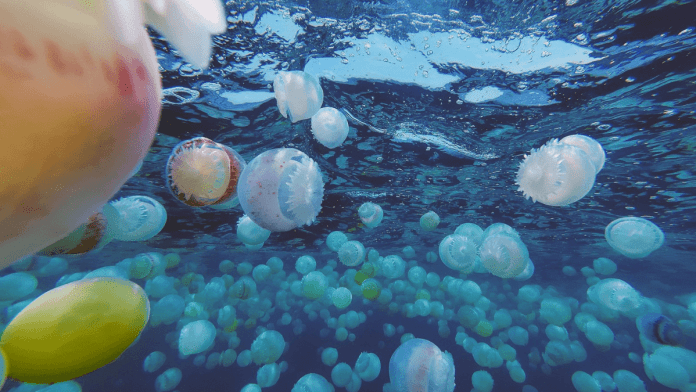News in Brief:
– In Venezuela’s Aragua region, a surge of invasive jellyfish is decimating local fishing stocks, posing a dire threat to coastal communities.
– Fishermen are experiencing declines in catches, prompting calls for innovative solutions to address the ecological crisis and safeguard livelihoods.
Massive numbers of colourful jellyfish have recently been seen dotting the rivers of Aragua in Venezuela, disrupting fishing activities, a news report says. This surge, driven by climate change, is wreaking havoc on local fishing communities, posing a significant challenge to their way of life.
According to local fisherman Elvis Morillo, who hails from the village of Chuao, the influx of jellyfish is unprecedented. “It’s like there are flowers in the sea. This has never happened before,” Morillo remarked, highlighting the novelty and concern surrounding this phenomenon.
The surge in jellyfish populations is attributed to the warming waters caused by climate change. As temperatures rise, these gelatinous creatures thrive, while their natural predators, such as sharks and sea turtles, decline in numbers. Consequently, fishermen find their nets filled with invasive cannonball jellyfish, severely impacting their catch.
Compounding the problem, essential species like sardines, crucial as fishing bait, have dwindled, leading to a drastic decline in overall fish stocks. Gustavo Carrasquel of the NGO Azul Ambientalistas noted that fishing levels have plummeted to their lowest in years, exacerbating the economic strain on coastal communities.
Environmental concerns
Researchers warn of a potential tipping point where jellyfish dominance could replace fish populations due to overfishing. The spread of invasive coral species further compounds environmental challenges, smothering native corals and aggravating the situation for local fishermen.
The surge in jellyfish has decimated fishing yields, with Chuao fishermen experiencing a staggering drop from 3,000-5,000 kilograms per week to a mere 500-1,000 kilograms. Fernando Mayora, head of the fishermen’s council in Choroni, lamented the dire situation, emphasizing the urgent need for solutions.
Despite the crisis, there is a glimmer of hope in exploring commercial opportunities. Drawing inspiration from countries like Mexico, where jellyfish are exploited for gastronomy and pharmaceutical purposes, Venezuela seeks to leverage this resource to mitigate the economic impact on its coastal communities.



